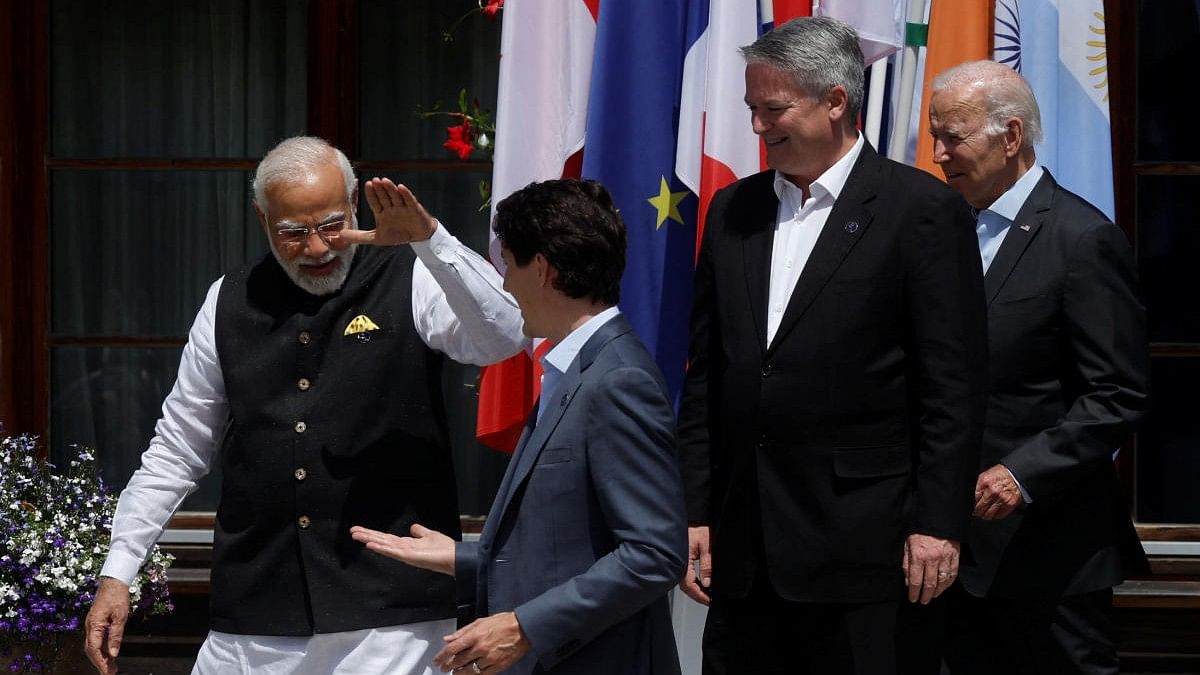
Canadian Prime Minister Justin Trudeau greets Indian Prime Minister Narendra Modi, as G7 and invited Heads of State and Government line up for a family photo in front of Schloss Elmau castle in the Bavarian Alps near Garmisch-Partenkirchen, June 27, 2022.
Credit: Reuters Photo
Following an uncharacteristic accusation by Canada against Indian High Commissioner Sanjay Kumar Verma — who has a distinguished 36-year diplomatic career — and other diplomats regarding an alleged murder plot on Canadian soil, relations between the two countries have quickly deteriorated.
The impasse, which began with Canadian Prime Minister Justin Trudeau’s statement in the House of Commons on September 18, 2023, where Ottawa alleged the "potential" involvement of Indian agents in the killing of Khalistan separatist Hardeep Singh Nijjar, appears inexorably intractable.
India had rejected Trudeau's claims unequivocally on September 19, 2023, terming them “absurd and motivated.”
However, the latest turn of events, coupled with the Trudeau government's efforts to pursue the issue — especially through public statements — has plunged relations into a deeper crisis.
The External Affairs Ministry on October 14 summoned Canada's chargé d'affaires in New Delhi Stewart Wheeler. It termed the allegations as “preposterous imputations” and ascribed them to the political agenda of the Trudeau government that “centred around vote bank politics.”
On October 14, India decided to withdraw Verma and five of his colleagues and expelled six Canadian diplomats later that day.
The latest move of Canada to investigate Indian envoy and other diplomats as “persons of interest” in the alleged killing of Nijjar, a designated terrorist before Indian law, is unheard of between two friendly countries, fellow-democracies with strong people-to-people connection, and robust business ties.
With nearly 1.8 million diaspora and another 1 million Non-Resident Indians, Canada hosts one of the largest Indian diaspora abroad, which accounts for more than 3% of its total population. India is also the largest source country of foreign students with an estimated 427,000 Indian students studying in Canada. More than 600 Canadian companies have established a presence in India, with more than 1,000 actively pursuing business opportunities in the Indian market.
What is even more telling is the tone and tenor of Indian rebuttal on how this development “serves the anti-India separatist agenda that the Trudeau Government has constantly pandered to for narrow political gains.”
India had then charged that the Canadian government has not shared a “shred of evidence with the Government of India, despite many requests from our side” and has decided to withdraw the High Commissioner and other targeted diplomats and officials.”
As the leader of a shaky coalition, Trudeau's appeal to Sikh voters by pandering to separatist elements has consistently drawn India's ire.
A vast majority of Sikhs do not support any radicals or extremists. The number of Sikhs living in various states of India other than Punjab is more than 5.5 million, much more than their number in any other country.
India has been raising very serious concerns about the anti-India activities of Khalistan supporters with Western capitals, including Ottawa, seeking their co-operation in curbing their actions and bringing them to justice.
However, the response has mostly been tepid. While Western nations often preach about the inviolable nature of a country's sovereignty and integrity, this rhetoric tends to arise only in contexts that align with their chosen narratives.
Canada is a G7 country, a NATO ally, a member of the five-member Anglosphere intelligence alliance, Five Eyes along with the United States, New Zealand, Australia, and the United Kingdom.
The ongoing row between India and Canada also underscores how Western concepts of alliances, including the Five Eyes, a revived remnant of World War II, operate in a multipolar world.
The Five Eyes will continue to take a monochromatic stand on any issues involving another member in sync with the latent narratives of an alliance despite all of them enjoying good ties with India.
This is something India needs to negotiate more carefully. Alignment of interests is more important for countries such as India than being part of an alliance as inherently understood and unfailingly practised by the Anglo-Saxon world.
The alliance-based approach that the US and West traditionally used to build relationships with allies and isolate non-allies is at a historic crossroad that has been robust for long. But permanence cannot be its hallmark in the changing world.
India's security co-operation dynamics with individual Five Eyes members will always be different. It could continue unimpeded with Australia while regional dynamics will influence its security co-operation with the US. India may find its security collaboration with the UK to be tricky due to historical reasons. But in the times of multi-polarity and plurilateral formats, finding shared interests with all major powers in the world is no major task for India.
(Jayanth Jacob, a foreign policy commentator, has covered the Ministry of External Affairs for over two decades. X: @jayanthjacob.)
Disclaimer: The views expressed here are the author's own. They do not necessarily reflect the views of DH.